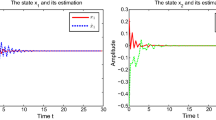Abstract
This paper investigates the problem of receding horizon state estimation for networked control systems (NCSs) with random network-induced delays less than one sample period, which are formulated as multirate control systems. Based on a batch of recent past slow rate measurements in a finite horizon window, the initial state estimation in this window is solved by minimizing a receding-horizon objective function, and then the fast rate state estimations are calculated by the prediction of dynamic equation to compensate for the network-induced time delays. Furthermore, convergence results and unbiasedness properties are analyzed. An upper bound of estimation error is presented under the assumption of bounded disturbances acting on the system and measurement equations. A simulation example shows the effectiveness of the proposed method.
Similar content being viewed by others
References
Zhang L, Shi Y, Chen T, et al. A new method for stabilization of networked control systems with random delays. IEEE Trans Autom Control, 2005, 50(8): 1177–1181
Hu S, Zhu W. Stochastic optimal control and analysis of stability of networked control systems with long delay. Automatica, 2003, 39: 1877–1884
Liu G, Xia Y, Rees D, et al. Design and stability criteria of networked predictive control systems with random network delay in the feedback channel. IEEE Trans Syst Man Cy C, 2007, 37(2): 173–184
Gao H, Chen T. Network based H ∞ output tracking control. IEEE Trans Autom Control, 2008, 53(3): 655–667
Gao H, Chen T, Lam J. A new delay system approach to network based control. Automatica, 2008, 44(1): 39–52
Goodwin G C, Haimovich H, Quevedo D E, et al. A moving horizon approach to networked control system design. IEEE Trans Autom Control, 2004, 49(9): 1427–1445
Walsh G C, Ye H, Bushnell L G. Stability analysis of networked control systems. IEEE Trans Control Syst Tech, 2002, 10(3): 438–446
Tang P L, De Silva C W. Compensation for transmission delays in an ethernet-based control network using variable-horizon predictive control. IEEE Trans Control Syst Tech, 2006, 14(4): 707–718
Sheng J, Chen T, Shah S L. Optimal filtering for multirate systems. IEEE Trans Autom Control, 2005, 52(4): 228–232
Shu H, Chen T, Francis B A. Minimax design of hybrid multirate filter banks. IEEE Trans Circuits-II, 1997, 44(2): 120–128
Young S S, Hong H L, Young S R, et al. Networked control systems using H 2 multirate control. Proceedings. In: 2004 IEEE International Workshop on Factory Communication Systems, Vienna, Austria,, 2004. 403–406
Lin H, Antsaklis P J. Stability and persistent disturbance attenuation properties for a class of networked control systems: switched system approach. Int J Control, 2005, 78(18): 1447–1458
Sahebsara M, Chen T, Shah S L. Optimal H 2 filtering in networked control systems with multiple packet dropout. IEEE Trans Autom Control, 2007, 52(8): 1508–1513
Sahebsara M, Chen T, Shah S L. Optimal H 2 filtering with random sensor delay, multiple packet dropout and uncertain observations. Int J Cont, 2007, 80(2): 292–301
Christopher V R, James B R, Jay H L. Constrained linear state estimation-a moving horizon approach. Automatica, 2001, 37: 1619–1628
Ling K V, Lim K W. Receding horizon recursive state estimation. IEEE Trans Autom Control, 1999, 44(9): 1750–1753
Alessandri A, Baglietto M, Battistelli G. Receding-horizon estimation for discrete-time linear systems. IEEE Trans Autom Control, 2006, 48(3): 473–478
Author information
Authors and Affiliations
Corresponding author
Additional information
Supported by the National Natural Science Foundation of China (Grant Nos. 60774015, 60674018, 60825302), the National High-Tech Research & Development Program of China (Grant No. 2006AA04Z173), the Specialized Research Fund for the Doctoral Program of Higher Education of China (Grant No. 20060248001), and partly by Shanghai Natural Science Foundation (Grant No. 07JC14016)
Rights and permissions
About this article
Cite this article
Zou, Y., Li, S. Receding horizon estimation to networked control systems with multirate scheme. Sci. China Ser. F-Inf. Sci. 52, 1103–1112 (2009). https://doi.org/10.1007/s11432-009-0106-9
Received:
Accepted:
Published:
Issue Date:
DOI: https://doi.org/10.1007/s11432-009-0106-9




